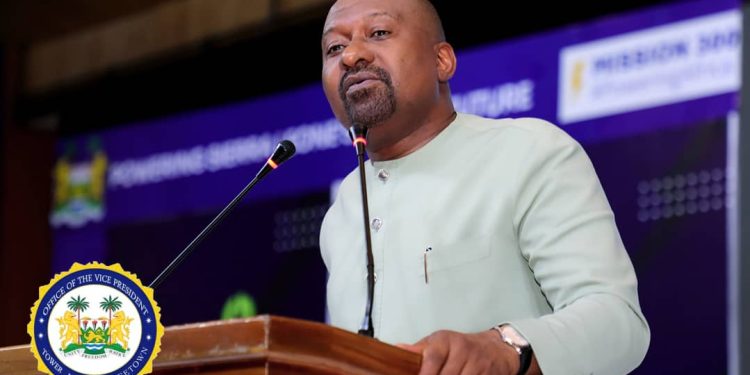By Hassan Osman Kargbo
Vice President of Sierra Leone, Dr. Mohamed Juldeh Jalloh, has called for stronger collaboration between the government and Non-Governmental Organizations (NGOs), emphasizing that such partnerships are vital for national development, transparency, and accountability.
Speaking at the NGO Dialogue Day held on Thursday, October 9, 2025, at the Brookfields Hotel in Freetown, Dr. Jalloh said the event demonstrated government’s commitment to fostering mutual trust and cooperation with development partners.
He noted that the engagement would improve coordination and communication between the government and NGOs, as well as address emerging challenges affecting their operations. The Vice President expressed government’s appreciation for the contributions of NGOs in transforming lives, improving wellbeing, and advancing human development across the country.
Dr. Jalloh, however, admitted that Sierra Leone is facing major challenges due to a decline in donor funding. He cited the example of the health sector, which recently lost over $40 million in USAID support, creating a significant gap in service delivery.
“In the face of dwindling external assistance, the government has taken decisive steps to strengthen fiscal policies, boost local production, and create opportunities for private sector growth,” he said. “These measures are necessary to reduce dependence on donor aid and expand the fiscal space needed to deliver on key national priorities.”
Delivering his presentation, the Board Chair of the Sierra Leone Association of Non-Governmental Organizations (SLANGO), Mr Christian Martyn Kamara provided an overview of ongoing NGO development projects across the country. He said there are currently 209 development projects being implemented by over 62 local and international NGOs in sectors such as health, education, agriculture, gender, and water and sanitation.
Mr Martyn Kamara disclosed that out of the 209 projects, 188 are actively being implemented, while 18 are still in draft stages due to funding delays. Twenty-four projects have been closed either because their life cycles have ended or funding has been discontinued, and five projects remain pending. He also noted that 75 projects are “very active,” reflecting a strong commitment despite current financial challenges.
In her remarks, International NGO Forum Co-Chair and Country Director, Davina Jeffery, highlighted key challenges faced by international NGOs, including funding cuts, taxation issues, and lack of clarity regarding the role of the Parliamentary Committee overseeing NGO affairs.
Jeffery called for a review of the Pay As You Earn (PAYE) taxation policy to ensure that taxes are applied fairly to basic salaries, and requested that mandatory NaSSIT contributions for international staff be reconsidered. She also emphasized the need for better coordination between the Ministry of Planning and Economic Development (MoPED) and Parliament, along with revisions to the Daily Subsistence Allowance (DSA) policy to address disparities in accommodation, transport, and payments.
Commissioner-General of the National Revenue Authority (NRA), Jeneba J. Bangura, assured NGOs that discussions are ongoing to streamline tax and duty waiver processes. She said proposals are being considered to extend existing waivers to the first half of 2025 and to reduce financial losses through improved administrative efficiency.
The Dialogue Day concluded with participants reaffirming their commitment to strengthening collaboration between the government and NGOs to build a more resilient and inclusive Sierra Leone.











